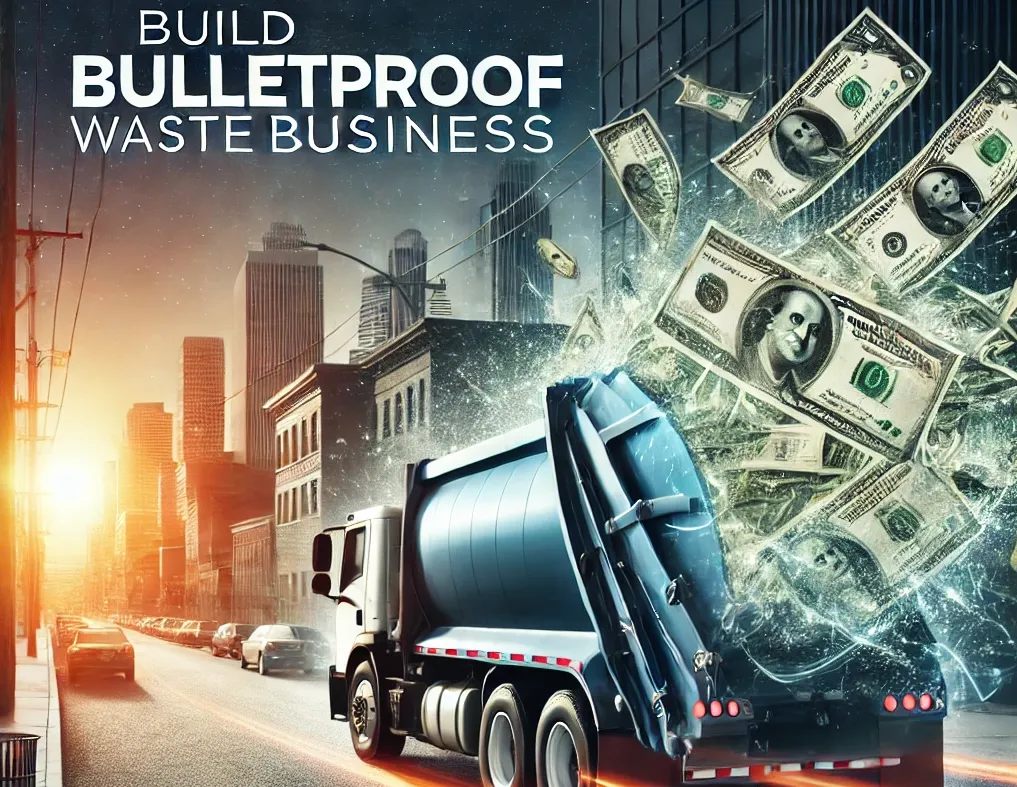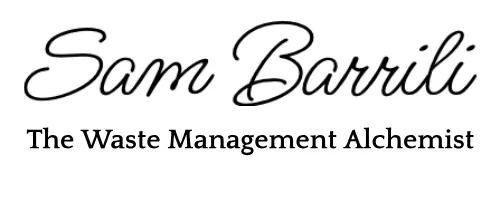Articles

How to Build a Bulletproof Waste Business Using Cash Flow and Banking as Your Secret Weapons
Dear Waste Management Professional,
Let me ask you a hard question: Are you running your business, or is your business running you?
If you’ve been in this industry for any length of time, you know that success doesn’t just come from hard work. It's not enough to pick up trash, send out invoices, and hope for the best. You need to master the money game, or you’ll find yourself at the mercy of overdue payments, unexpected expenses, and competitors who seem to grow while you tread water.
Today, I’m here to tell you that the secret to building a thriving waste management business lies in mastering two critical elements: cash flow and banking relationships. These are the pillars that will keep your company running smoothly while creating the foundation for explosive growth.
[Download the Ebook “Thriving With Waste”]
The Truth About Cash Flow
Cash flow is the lifeblood of any business, but in waste management, it’s oxygen. Without it, your trucks don’t roll, your employees don’t get paid, and your customers don’t stick around. Here’s what I see time and time again when I work with waste companies: they confuse revenue with cash flow.
Let’s break it down.
Revenue is what your customers owe you.
Cash flow is what’s actually in your bank account, ready to pay the bills.
You might have the biggest contracts in your market, but if you’re waiting 60 or 90 days to get paid while your fuel, payroll, and tipping fees are due every week, you’re skating on thin ice. The gap between what’s owed to you and what you owe others can crush your business faster than a compactor crushes a dumpster.
[Download the Ebook “Thriving With Waste”]
How to Take Control of Your Cash Flow
Managing cash flow isn’t rocket science, but it does require discipline and systems. Here are the three most powerful moves you can make to put yourself in the driver’s seat:
Tighten Up Your Accounts Receivable
Slow-paying customers are your worst enemy. Train your team to invoice immediately after service and follow up like your business depends on it—because it does. Consider offering discounts for early payments or using payment technology that makes it easy for clients to pay on time.Align Your Payment Cycles
If your suppliers and landfill operators expect payment in 15 days, but your customers are on net-60 terms, you’re financing their operations out of your pocket. Negotiate longer terms with vendors or shorter terms with clients to close this gap.Build a Cash Cushion
Aim to have at least one month’s operating expenses in reserve. This is your safety net when a truck breaks down, fuel prices spike, or a client fails to pay on time. Start small, but make it a priority.
[Download the Ebook “Thriving With Waste”]
Banking: Your Secret Weapon
Now let’s talk about your relationship with the bank. Most waste management owners think of their bank as nothing more than the place their money goes after a client pays. Big mistake. A good banking relationship is a strategic tool that can help you not only survive but thrive.
Why Banking Matters More Than You Think
Banks aren’t just a place to park your cash. They’re your partner in growth. The right banking setup can solve many of the problems that keep waste company owners up at night, like:
Bridging Cash Flow Gaps: A business line of credit gives you the breathing room to cover expenses while you wait for customer payments. Think of it as a financial buffer that keeps your wheels turning.
Funding Equipment Purchases: Trucks, dumpsters, and compactors aren’t cheap, and paying for them out of pocket ties up cash you could use elsewhere. Financing lets you spread out the cost while keeping your business nimble.
Improving Your Margins: Some banks offer fuel cards or rebate programs that can shave thousands off your annual operating costs. Others provide cash management tools to speed up collections and reduce late payments.
[Download the Ebook “Thriving With Waste”]
How to Build a Banking Relationship That Works for You
If you’re not actively managing your banking relationship, you’re leaving money on the table. Here’s how to get the most out of it:
Choose the Right Bank
Not all banks understand the needs of waste management businesses. Look for a bank that works with small to medium-sized businesses, offers flexible credit options, and has experience with industries like yours.Leverage Your Banker’s Expertise
Your banker isn’t just a gatekeeper to loans—they’re an advisor. Meet with them regularly to discuss your cash flow, financing needs, and growth plans. The better they understand your business, the more they can help.Use Credit Strategically
Credit isn’t just for emergencies. Use it to seize opportunities, like buying new equipment, expanding your routes, or investing in marketing. Just make sure you’re borrowing for growth, not survival.
[Download the Ebook “Thriving With Waste”]
The Intersection of Cash Flow and Banking: Your Growth Engine
Here’s where things get interesting. When you combine strong cash flow management with a solid banking relationship, you create a powerful engine for growth. Let me show you how it works:
Imagine you’ve been running a profitable waste management business for five years. You’ve got a fleet of 10 trucks and a loyal customer base, but you’re maxed out. A new contract opportunity comes up that could double your revenue, but it requires adding two trucks and hiring more drivers. Without cash flow and banking systems in place, you might have to pass on the deal.
But if you’ve mastered the money game, here’s what you can do:
Use your cash reserves to cover the upfront costs of onboarding new clients.
Leverage a line of credit to bridge cash flow gaps as the new revenue ramps up.
Finance the trucks through your bank to conserve working capital.
In this scenario, your competition sees a roadblock, but you see a runway. That’s the power of playing offense with your money.
[Download the Ebook “Thriving With Waste”]
The Cost of Ignoring These Pillars
Now, let’s flip the coin. What happens if you don’t take this seriously?
You lose control. Late payments from customers snowball into late payments to your vendors, and suddenly your reputation is on the line.
Opportunities slip away. You’re stuck in survival mode, unable to invest in growth or bid on lucrative contracts.
You burn out. Instead of running your business, you’re putting out financial fires, robbing Peter to pay Paul, and hoping things improve.
And let me tell you, hope is not a strategy.
[Download the Ebook “Thriving With Waste”]
Why This Matters Now
The waste management industry is changing fast. Fuel prices are unpredictable, regulations are tightening, and competition is fiercer than ever. If you’re not optimizing your cash flow and banking relationships, you’re falling behind.
But here’s the good news: You don’t have to do this alone. These challenges are solvable, and when you solve them, you unlock a level of freedom and growth most business owners only dream about.
[Download the Ebook “Thriving With Waste”]
Your Next Move
If any of this resonates with you, it’s time to take action. Start by asking yourself these three questions:
Do I have a clear view of my cash flow every week?
Am I using my banking relationship as a growth tool, or is it just a place to deposit checks?
What would my business look like if cash flow and financing were no longer a worry?
If the answers make you uncomfortable, that’s a good thing. It means you’re ready to change.
I help waste management owners like you turn financial chaos into clarity and unlock the potential hidden in your business. If you’re ready to take the first step, let’s talk. Book a consultation with me today, and let’s build a plan to make your business thrive.
Because in this business, you’re either moving forward—or getting left behind.
[Download the Ebook “Thriving With Waste”]
To your success,
Sam Barrili
The Waste Management Alchemist


Sam Barrili
I'm known as the go-to guy for talking about business strategies and growth strategies for waste management companies.
I started my journey in this field in 2009 when I finished my degree in Toxicological Chemistry and joined a wastewater treatment company to develop its market.
Since then, I helped dozens of waste management companies in America and Europe increase their annual profits by over 25 million dollars thanks to my SAM Method.
If you want to know if I'm a good fit for you, read an article or watch a video.
If you find it helpful, I’m probably a good match.
If not, that's OK too.
Call +1 (801) 804-5730
Email: [email protected]

